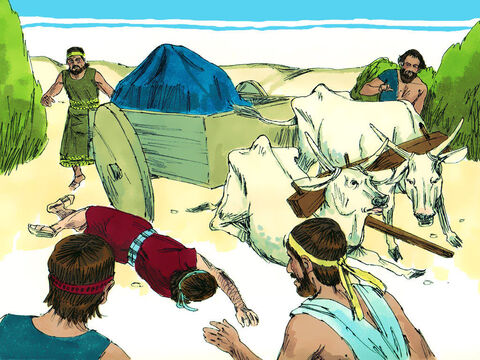
“It upset David that Adonai had broken out against ‘Uzah; that place has been called Peretz-‘Uzah [breaking-out of ‘Uzah] ever since.”-2 Samuel 6:8
Ever had your plans completely derailed by something unexpected happening?
For example…
I was all set for an amazing Thailand vacation a couple of years ago, but COVID-19 hit, and I had to cancel everything.
Or I read about a couple who spent months planning their dream outdoor wedding, only for a hurricane to destroy the venue days before, forcing them to reschedule.
Or how about all those folks who save for years to retire and travel, but a serious illness strikes them down, instantly causing all their retirement dreams to go out the window?
Well, a similar thing happened to King David and his men when they tried to transport the Ark of the Covenant to Jerusalem.
The journey began with high hopes but then disaster struck.
When the Ark was about to fall off of the oxcart (where it never should’ve been placed, to begin with), Uzah tried to steady it with his hand and died on the spot.
This unnerved David so much that he immediately canceled the trip.
Verse 8 tells us that Uzah’s death made David “upset.”
The original Hebrew is CHARAH or חָרָה.
It means “to be angry” or “to be hot.”
It conveys a sense of burning intensity, either in anger or displeasure.
It can also indicate a strong emotional response, like frustration or outrage.
So why was David so frustrated?
For the same reason, we all get frustrated when our carefully laid-out plans are thwarted by the unexpected.
He wasn’t able to bring the Ark into his city as he had planned.
On top of that, he had no idea why the Lord reacted the way He did, and that mystery scared the hell out of him!
Remember, I told you earlier that David possessed no practical understanding of proper Torah protocol?
If David had known the Law, Uzah toppling over dead wouldn’t have been a mystery to him.
What’s even more tragic is the Levites didn’t know the Law either.
If they had, they could’ve explained to David what went wrong and how to avoid the same thing from happening in the future.
However, everyone was completely in the dark…
So David decided an abundance of caution was the wisest course of action.
As I mentioned earlier, Uzah’s death happened at a place called goren nakhon, which means “the threshing floor of the stroke.”
It wasn’t named after some dude called Nakhon.
After the incident, the spot was memorialized with a new name: Peretz-Uzah, which means “bursting out against Uzah.”
David decided not to send the Ark back to Kiryat Ye’arim but instead decided to let someone else take care of it for now.
We don’t know exactly why he made this choice, but it’s pretty clear—he figured he’d let someone else take the risk and see what happens.
Verses 10 and 11 tell us that the person who would take on the Ark was Oved-Edom the Gittite (or more likely, the Gathite).
Alrighty, this post is getting long…
So let’s switch over to the takeaway.
When Paul wrote his second letter to Timothy, this is what he declared about Scripture:
“All Scripture is God-breathed and is useful for teaching, rebuking, correcting and training in righteousness, so that the servant of God may be thoroughly equipped for every good work.”-2 Timothy 3:16
First, a reminder that “Scripture” here is ONLY referring to the Hebrew Bible or what Gentiles refer to as the “Old Testament.”
It would be a full century before the New Testament would even come into existence when Paul penned these words.
Never forget that the early Messianic believers preached the gospel from the Hebrew Bible…
Because that was the only Scripture they had!
Alright, homies.
So here’s the point I wanted to make.
If David could have avoided the tragedy of Uzah’s death by knowing Scripture…
Don’t you think Scripture might help us a little bit in our faith walk with God?
Pardon my sarcasm, but I think you get my point.
I leave you with these words from the opening words of the Book of Psalms:
“Blessed is the one
who does not walk in step with the wicked
or stand in the way that sinners take
or sit in the company of mockers,
but whose delight is in the law of the Lord,
and who meditates on his law day and night.
That person is like a tree planted by streams of water,
which yields its fruit in season
and whose leaf does not wither—
whatever they do prospers.”



Leave a Reply